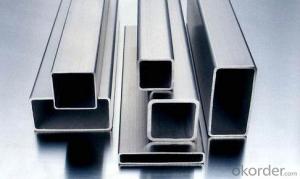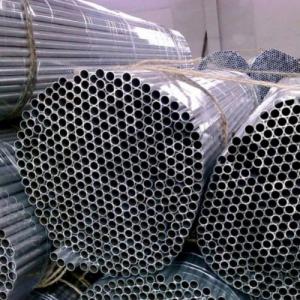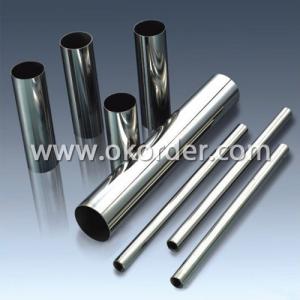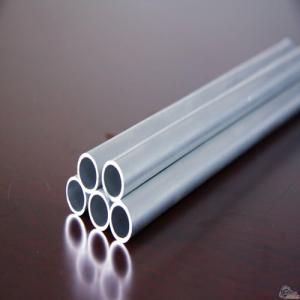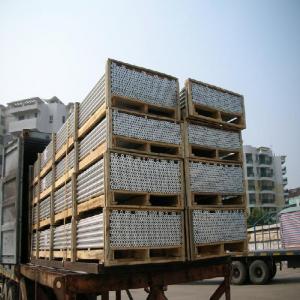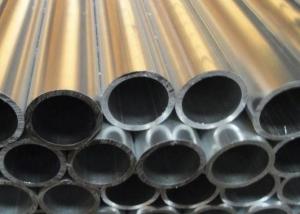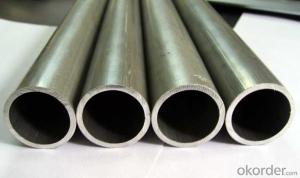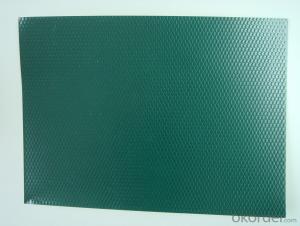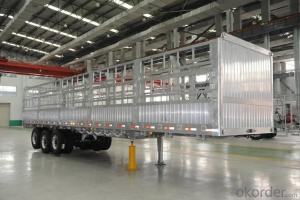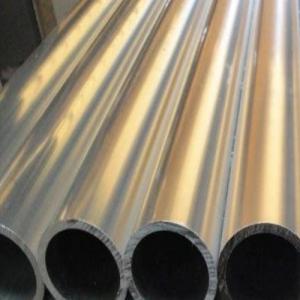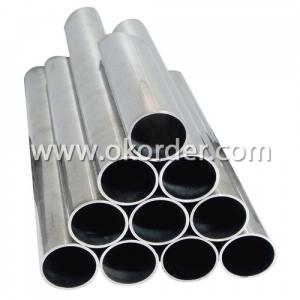Aluminium Square Pipe-AA 6005
- Loading Port:
- China Main Port
- Payment Terms:
- TT OR LC
- Min Order Qty:
- -
- Supply Capability:
- -
OKorder Service Pledge
OKorder Financial Service
You Might Also Like
Aluminum alloy | 6063,6061,6005,6082,7075,1050etc |
Temper | T3-T8 |
shape | square, round, flat, angle ,etc |
surface | Anodizing ,Powder coating, Electrophoresis, etc |
Deep processing ability | Drill hole ,stretch bending, milling, welding, fabrication, etc |
Usage | Windows & door , LED panel, heat sink , curtain wall , solar Panel Frame, rail & fence , ladder ,etc. |
MOQ | 1Ton |
Packing | According to your requirement ,such as shrink wrap, plastic bag, kraft paper ,etc. |
Delivery | 15-20days after sample confirmed & down payment. |
Loading port | Quanzhou, Xiamen |
Shipping term | EXW,FOB,CFR,CIF |
Payment term | T/T,30% advanced deposit, the balance paid off before loading, or consulting |
Moulds | 1,Using our moulds ,no fee |
2,Using customer drawing, opening mould, usually over 4tons then the moulds fee can be refunded | |
3,Mould cost is negotiable base on the order quantity |
- Q:0 `# U5 T4 J* Z+ M+ P& F5 "| _# G& _ now refrigeration accessories vendors, sales are not heat shrinkable aluminium outer protective sleeve, is coated with a layer of red things, do not know how long can use aluminum `# O4 ` (C (g$Q8 u b heat shrinkable tube can be used for long v$! D/ J'B. Q;}; C']
- The sky see now actually used outside heat shrinkable tubes of the copper tube, do not look carefully thought is copper
- Q:Can aluminum pipes be threaded?
- Yes, aluminum pipes can be threaded.
- Q:Are aluminum pipes suitable for paper mills?
- Certainly, aluminum pipes demonstrate suitability for paper mills. Renowned for their exceptional resistance to corrosion, aluminum pipes offer significant advantages in paper mills where chemicals and moisture are present. Moreover, their lightweight nature simplifies handling and installation, thereby reducing labor expenses. Additionally, their commendable thermal conductivity facilitates efficient heat transfer across diverse paper mill procedures. Furthermore, aluminum pipes can be effortlessly fabricated and tailored to meet precise specifications, ensuring seamless integration with the paper mill's infrastructure. In conclusion, aluminum pipes deliver durability, adaptability, and economic feasibility, rendering them an appropriate selection for paper mills.
- Q:Are aluminum pipes suitable for outdoor applications?
- Yes, aluminum pipes are suitable for outdoor applications. Aluminum is highly resistant to corrosion, making it a durable option for outdoor use. It also has a high strength-to-weight ratio, making it easy to handle and transport for various outdoor projects. Additionally, aluminum pipes can withstand extreme weather conditions and temperature changes, further enhancing their suitability for outdoor applications.
- Q:Are aluminum pipes suitable for chemical processing plants?
- Depending on the specific requirements and conditions of the plant, aluminum pipes can be a suitable option for chemical processing plants. They offer several advantages in this application. Firstly, aluminum is lightweight, making it easier to handle and install compared to materials like steel. This can help reduce labor and transportation costs during installation. In addition, aluminum pipes have good corrosion resistance properties, which is crucial in chemical processing plants where exposure to corrosive chemicals is common. Aluminum naturally forms a protective oxide layer on its surface, preventing further corrosion. This layer can be further enhanced through surface treatments to improve resistance to specific chemicals. Furthermore, aluminum pipes have excellent thermal conductivity, facilitating efficient heat transfer in chemical processes that involve heating or cooling. This can lead to energy savings and improved operational efficiency. However, it's important to note that aluminum pipes may not be suitable for all chemical processing applications. They can react with certain aggressive chemicals or extreme conditions, such as high temperatures or extreme pH levels. In such cases, alternative materials like stainless steel or specialty alloys may be more appropriate. Therefore, it is crucial to thoroughly evaluate the specific requirements, chemicals involved, and operating conditions before using aluminum pipes in a chemical processing plant. Consulting with experts or engineers is necessary to determine their suitability and any necessary precautions or limitations.
- Q:What are the different surface finishes available for aluminum pipes?
- Aluminum pipes come in a variety of surface finishes, each offering its own unique advantages and visual appeal. One option is the mill finish, which is the natural appearance of aluminum after extrusion and before any further treatment. Although it has a smooth and shiny look, it may have minor imperfections and marks from the manufacturing process. Another possibility is the anodized finish, achieved through an electrochemical process that gives the aluminum a durable and corrosion-resistant surface. Anodized finishes can range from clear to various colors, providing both protection and an enhanced visual appeal. Powder coating is a popular choice for aluminum pipes, involving the application of a dry powder that is then cured under heat to create a sturdy and long-lasting finish. This type of finish offers excellent resistance to scratching, chipping, and fading, and is available in a wide array of colors and finishes. To achieve a more polished and glossy appearance, aluminum pipes can be polished or buffed. This process creates a reflective surface that enhances the aesthetic appeal of the pipe, making it suitable for decorative applications. Lastly, aluminum pipes can be painted with different types of coatings, such as epoxy or polyester, to provide protection and achieve a desired color or texture. Painted finishes offer versatility in terms of color options and can be customized to match specific design requirements. In conclusion, the choice of surface finish for aluminum pipes depends on factors such as the intended application, desired appearance, and required durability. Whether it's the mill finish, anodized, powder coated, polished, or painted, each finish provides its own unique advantages and can be chosen to meet specific functional and aesthetic needs.
- Q:Such questions. Recently prepared to buy an umbrella with the baby, too heavy to hold for a long time can not stand. Taobao took a look, the style is colorful. I saw 3 stalls tent, but there are two kinds of pipes, do not know what kind of practical. Steel pipe should be relatively strong and durable, the aluminum tube is characterized by light, but worried that the baby sit on top of instability. How do moms choose?
- The umbrella car is better than the aluminum tube.The heat exchange of aluminum is faster than that of steel, so the cooling speed is faster and the cost is almost the same as steel. Because aluminum will not rust, so the latter does not need steel platoon, as rust preventive maintenance.
- Q:How do aluminum pipes compare to steel pipes?
- The properties and applications of aluminum pipes and steel pipes differ significantly. To begin with, aluminum pipes are considerably lighter than steel pipes, making them more convenient for transportation and installation purposes. Their lightweight nature makes them commonly utilized in industries where weight reduction is crucial, such as aerospace and automotive. Conversely, steel pipes are much heavier, rendering them suitable for applications that demand high strength and durability, like construction and infrastructure projects. Furthermore, aluminum pipes exhibit excellent corrosion resistance, especially when exposed to the atmosphere. This makes them well-suited for outdoor applications where they come into contact with moisture and other elements. On the contrary, steel pipes are prone to corrosion and necessitate additional coatings or treatments to safeguard against rust and deterioration. In addition, aluminum pipes possess higher thermal conductivity in comparison to steel pipes. This characteristic makes them ideal for applications that require efficient heat transfer, such as HVAC systems or heat exchangers. On the other hand, steel pipes have lower thermal conductivity but offer superior fire resistance, making them suitable for applications where fire protection is essential. Lastly, cost plays a vital role in comparing aluminum pipes to steel pipes. Aluminum pipes tend to be more expensive than steel pipes due to the higher cost of raw materials and manufacturing processes. Nevertheless, their long-term maintenance costs can be lower due to their corrosion resistance and lightweight properties, leading to reduced labor and transportation expenses. In conclusion, aluminum pipes and steel pipes possess distinct properties and applications. Aluminum pipes are lighter, exhibit better corrosion resistance, higher thermal conductivity, and are suitable for industries that prioritize weight reduction. Conversely, steel pipes offer greater strength, durability, fire resistance, and are commonly employed in construction and infrastructure projects. Ultimately, the choice between aluminum and steel pipes depends on the specific requirements of the application and the trade-offs between cost, weight, strength, and other factors.
- Q:Can aluminum pipes be anodized for improved corrosion resistance?
- Yes, aluminum pipes can be anodized to enhance their corrosion resistance. Anodizing forms a protective oxide layer on the surface of the aluminum, increasing its resistance to corrosion and improving its durability.
- Q:Can aluminum pipes be used for hydroponic systems?
- Yes, aluminum pipes can be used for hydroponic systems. Aluminum is a lightweight and durable material that is resistant to corrosion, making it suitable for water-based hydroponic setups. It can be easily shaped and assembled, allowing for flexibility in designing the system. However, it is important to ensure that the aluminum pipes are properly coated or lined to prevent any potential leaching of aluminum into the nutrient solution.
1. Manufacturer Overview |
|
|---|---|
| Location | |
| Year Established | |
| Annual Output Value | |
| Main Markets | |
| Company Certifications | |
2. Manufacturer Certificates |
|
|---|---|
| a) Certification Name | |
| Range | |
| Reference | |
| Validity Period | |
3. Manufacturer Capability |
|
|---|---|
| a)Trade Capacity | |
| Nearest Port | |
| Export Percentage | |
| No.of Employees in Trade Department | |
| Language Spoken: | |
| b)Factory Information | |
| Factory Size: | |
| No. of Production Lines | |
| Contract Manufacturing | |
| Product Price Range | |
Send your message to us
Aluminium Square Pipe-AA 6005
- Loading Port:
- China Main Port
- Payment Terms:
- TT OR LC
- Min Order Qty:
- -
- Supply Capability:
- -
OKorder Service Pledge
OKorder Financial Service
Similar products
New products
Hot products
Related keywords
